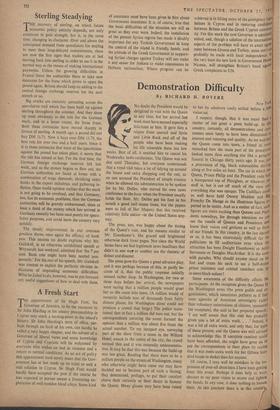Sterling Steadying
.economic recovery of sterling, on which future .1 economic policy entirely depends, not only continues to gain strength, but is, at the same time, changing its character. Over and above the anticipated demand from speculators for sterling to meet their long-delayed commitments, there are now the first signs that traders are at last moving back into sterling in order to use it in the normal way as the means of making international payments. Unless the growing difficulties in France' force the authorities there to take new measures for the franc which prove to upset the pound again, Britain should keep on adding to the central foreign exchange reserves for the next month or so.
Big cracks are certainly spreading across the speculative wall which has been built up against sterling throughout the summer. And they show up most obviously in the rate for the German mark, and to a lesser extent, the Swiss franc. Both these currencies have moved sharply in favour of sterling. A month ago, a pound did not buy DM 11.71. Now it buys over DM 11.79, the best rate for over two and a half years. Since it is in these currencies that most of the speculation against the pound has taken place, it seems that the tide has turned at last. For the first time, the German foreign exchange reserves fell list week, and as the money begins to flow out, the German authorities are faced at home with a combination of wage demands, shrinking order books in the export industries, and gathering in- flation. Once world opinion realises that the mark is not going to be revalued, and that Germany, too, has its economic problems, then the German authorities will be gravely embarrassed, since at least a third of the money which has arrived in Germany recently has been used purely for specu- lative purposes, and could leave the country very quickly.
The, steady improvement in our overseas position shows once again the efficacy of bank rate. This success no doubt explains why Mr. Gaitskell, in an otherwise uninhibited speech at Weymouth last weekend, admitted that 'the 7 per cent. Bank rate might have been needed tem- porarily.' For the rest of his speech, Mr. Gaitskell was content to exploit the perfectly obvious in- dications of impending economic difficulties. What he failed to do, however, was to put forward any useful suggestions of how to deal with them.


































 Previous page
Previous page